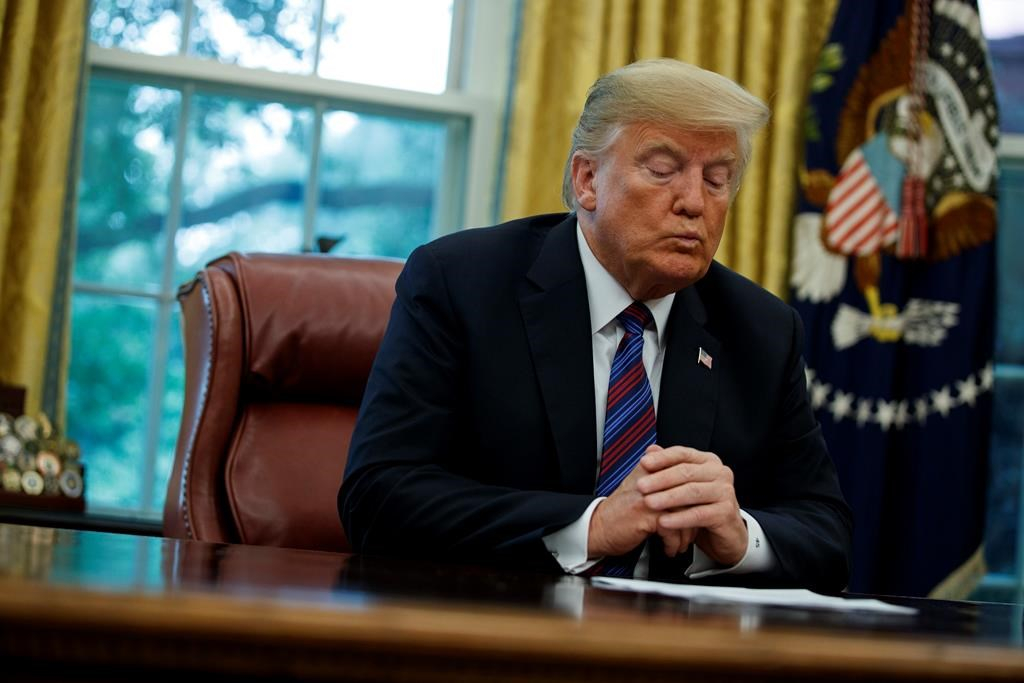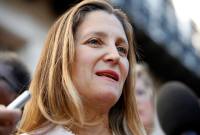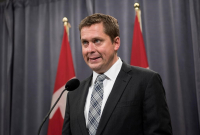Support strong Canadian climate journalism for 2025
U.S. President Donald Trump warned Congress on Saturday not to interfere with his plans for a new North American Free Trade Agreement, lest he cancel the deal entirely.
On Twitter, the president threatened to "terminate NAFTA entirely" if Congress balks at ratifying a revamped NAFTA that could go forward without Canada's involvement if ongoing negotiations fail.
Trump notified Congress on Friday of his intent to sign a revamped deal in 90 days with Mexico — and Canada too, if Ottawa chooses to join in.
But on Saturday, Trump said there was "no political necessity" to include Canada in a deal, and suggested he would scrap NAFTA entirely rather than allowing it to continue in its current form.
"If we don't make a fair deal for the U.S. after decades of abuse, Canada will be out," he wrote.
"Congress should not interfere with these negotiations or I will simply terminate NAFTA entirely and we will be far better off."
But simply pulling out of NAFTA may not be as clear-cut as the president suggested in his message, according to several trade experts.
Congress must approve any rewrite of the deal and could refuse to endorse an agreement that excludes Canada.
Moshe Lander, an economics professor at Concordia University, suggested Trump doesn't have the authority to pull out of NAFTA "in the simple way he presents."
He said the United States would have to give six months notice to both Canada and Mexico if it intends to withdraw.
And, while not all experts agree, he said he believes Trump would need congressional approval to end the agreement.
"Because NAFTA was enacted through an act of Congress, Congress has to undo it," he said in a phone interview.
At this stage, he said it's difficult to speculate on whether Congress will stand up to the president, especially since the contents of the deal have not yet been revealed.
But Gilles LeVasseur, a business and law professor at the University of Ottawa, said Trump's Saturday message reflects a certain nervousness that he might fail to win the support of a Congress that tends to be pro-trade.
"Congress is more open to Canada than we expect, Republicans and Democrats," he said.
"Yes they want changes, yes they want improvements, but they don't want to throw everything away."
Krzysztof Pelc, a political science professor at McGill University, said Trump is likely using the threat of excluding Canada to obtain more concessions in areas such as supply management and dispute resolution.
"Congress' refusal to ratify a deal without Canada in it weakens Trump's hand, so to achieve his ends, he's attempting to bully not only Canada, but the U.S. Congress as well," he wrote in an email.
Pelc said that Republican members of Congress as well as the U.S. Chamber of Commerce are "dead set" against a bilateral deal with Mexico.
However, he said the president could try to obtain ratification by "dangling the promise of letting Canada join later."
Talks between the two countries ended without an agreement on Friday as negotiators failed to reach an agreement to include Canada in the deal before notice was sent to Congress.
In response to Trump's latest message, the Canadian government stuck to the cautiously optimistic message that has become its standard response on the matter.
"As we've said all week, we're working toward a modernized NAFTA that is good for the middle class and people working hard to join it," spokesman Adam Austen said in a statement.
"With good will and flexibility on all sides, a win-win-win outcome is achievable."
Quebec Premier Philippe Couillard was more blunt, telling reporters that Trump is not a friend to Canada.
"The United States are a great friend and ally of Canada, but clearly Mr. Trump is not," he said while campaigning in Quebec City.
"He is certainly not an ally and is not acting like an ally, and not just with Canada."
Trump took to Twitter again Saturday night, tweeting "We shouldn't have to buy our friends with bad Trade Deals and Free Military Protection!"
Talks to keep Canada in the trade bloc are to resume Wednesday as the two countries try to resolve thorny issues including Canada's dairy market and U.S. efforts to shield drug companies from generic competition.




Comments